 Kids On Bikes
Kids On Bikes
Author: Jonathan Gilmour & Doug Levandowski
Publisher: Renegade Game Studios
Format: Tabletop RPG
Price: $25 softcover, $35 hardcover
Copy Provided By Publisher
For those of you who are looking for something different at the RPG table, I hear your requests now. A chorus of voices, saying things like “I need a TTRPG that’s super easy to play”. Easier even than the already rules light Overlight we reviewed not too long ago. Or maybe you need something very 1-shot event friendly. Or maybe you want something even more narrative-centered. Renegade still has you covered! That system exists, and it’s called Kids on Bikes.
In this modest book, small enough to flip through in a fraction of an afternoon, you get everything you’re looking for. You get rules for making characters in no time flat, rules for establishing your tiny town that, you guessed it, you can ride a bike across and back in a day. And you get a really nifty narrative that all the players collaboratively build alongside the GM. Plus a few surprises. Let’s take a look!
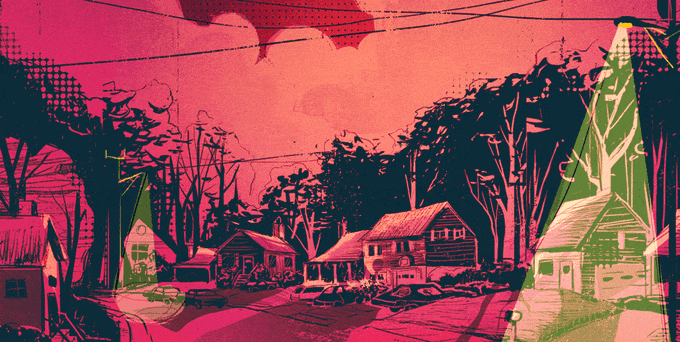
Ah, the town where everything can, and will, happen.
A Simpler Time
Kids on Bikes takes place in any small town your group can make up (and you will make one up). What are we doing in this town? For the most part we live our normal lives trying to be popular in school, working day jobs, hanging out around the local ice cream place on summer evenings, and you know, also getting wrapped up in weird things like aliens, monsters, magical beasts, superpowers, and dodging the men in black that always seem to show up in little towns like ours.
The character your town takes, along with its associated rumors, can take any shape you all want as long as it follows a couple of simple rules. For one, it has to be small enough that it’s the kind of place everyone more or less knows everyone else. Secondly, it has to be set in a time before smartphones. The specifics of that last bit are up to the table or the GM. You could put your town in the 80s à la Stranger Things, or you could go for that classic yet modern feel of the 50s. You characters just can’t whip out a tiny pocket computer and hit up Google when they need more information. The book explicitly says this, and trust me you’ll have a much better time for it.
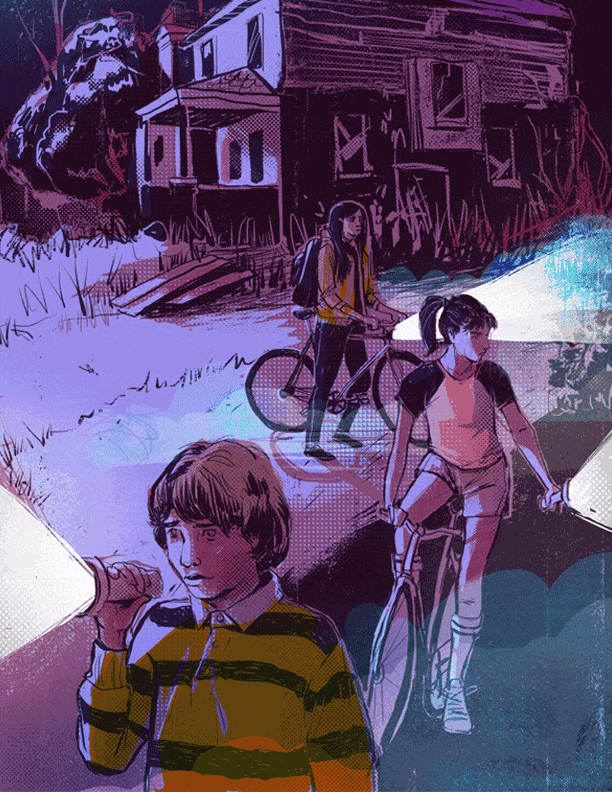
Because checking out the creepy house on the outskirts of town is always a favorite pasttime.
Commentary on our possible overuse of smartphones aside, from here we move right on to creation. Of our characters? How about of the setting itself! Character creation, and for that matter town, NPC, and relationship creation (since we’ll all be closely or loosely tied to one another) are all handled simultaneously and quickly! For characters you pick an age (child, teen or adult), a couple positive traits (that give you mechanical bonuses), a couple negative quirks (that are there for roleplay purposes only), and assign one of each die from 4-sided up to 20-sided to your six stats (rolling bigger dice for things you’re better at). Then we go around the table answering questions: what was our town known for? What are some rumors you’ve heard about it? What do you and this other character share a mutual, weird love of? By the time you’re done sharing around the table, you’ll have a whole setting the GM’s written down, reasons for mingling with the other players in game, and a whole hoard of rumors to investigate that the GM will decide in secret which are true and which are just rumors.
The book gives you lengthier versions of this process for groups that want to continue with a weekly campaign or pared down versions for single session events. Regardless of the length you’d like to play, though, that’s nearly it for hard mechanics of this system. Most everything is accomplished via narrative, though we’ll get to how you use dice in just a minute. What’s most surprising about such a small book and a simple premise is the inter-character and setting depth you’re thrown into right from the start. Renegade, as a maker of TTRPGs, I would say has definitely set itself apart in this regard!
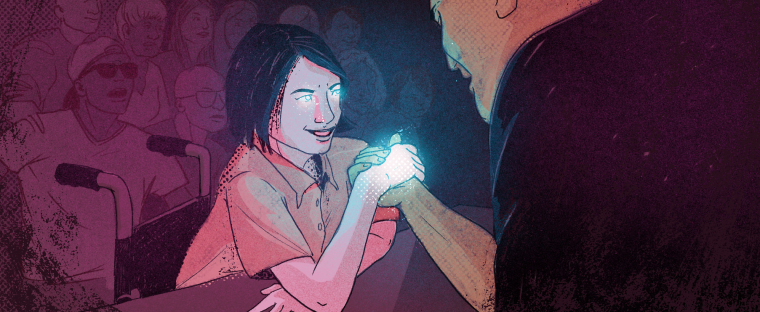
Strange powers in an arm wrestling contest definitely constitute cheating, but what's the character's motivation?
To Dice Or Not To Dice
I’ve said in my other review how I think the comparatively “heavier” system of Overlight lends itself to roleplay by design. This trend continues with Kids on Bikes, perhaps even moreso. Mechanically speaking, most things you do are handled through narrative, and dice rolls are kept to a minimum. There are no health tracks, for example. Damage is purely a factor of something hitting you and how bad it would be; imagine the difference between a fistfight with the school bully and having a taser fired at you by a government agent. And along those lines, this is where rolling dice makes its entrance.
Imagine your character is surrounded by cultists. “Fight” is the stat you’ve invested your d20 in, and so you ask the GM about rolling that as your way out of the situation. The GM informs you that you’re still just a kid and the three adults around you still pose a significant threat. The number you’ll have to roll at or above is a 14, representing a major challenge even for a kid whose parents enrolled them in martial arts classes a few years ago. But these cultists are also older, and you might be able to outrun them instead. Cleverly, you ask the GM about using your “Flight” stat instead, even though it uses a smaller die. The target difficulty of your roll is much lower, so you decide to go that route.
While players in Kids on Bikes are encouraged to use their stats creatively, this system of narrative differences encourages players to roleplay more rather than simply arguing with the GM that every situation can be solved by them rolling their best dice. What are the implications in the game if you roll Fight every single time you need to solve a problem? Kids on Bikes once again delivers on Renegade’s signature style of thought provoking, narrative-driven games with functionally fun yet minimally mandated use of dice.
Also, and this is a nice little touch worth mentioning, every time you fail a roll you get an Adversity Token that you can later use to boost future rolls or activate certain character perks. A little narrative tension due to failure early on can still result in a good outcome when things look bleakest.
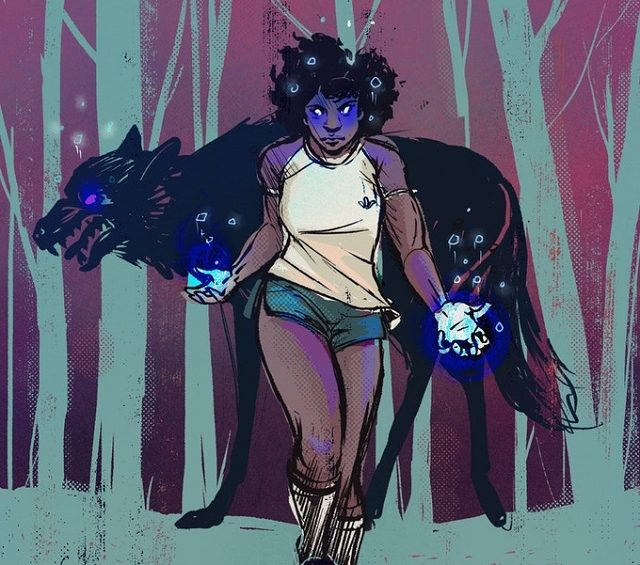
Something awesome this way comes!
That Special Something
Have you ever wondered what it would be like to play in a roleplaying game with your group’s very own E.T.? Or maybe tiny little robots akin to Batteries Not Included? Or maybe you found a small kid alone in the woods who doesn’t speak much but possesses strange telekinetic powers. This is where the truly unique mechanic of Kids on Bikes makes its entrance. You see, there’s a powered character, but they’re not solely controlled by any of the players or the GM! All the players share control of this additional character, a novel idea that’s managed by the GM writing down traits of the powered character on index cards and handing them out to the players (usually about 2 traits per player). If a trait matches what’s going on in the scene, say “very protective of their friends,” that player rotates their index card to show the table they’re taking control and they narrate the actions for the powered character.
There are all sorts of ways the book gives you to use this system. A GM could deal out the index cards as soon as the powered character is introduced, but they could also withhold cards, handing them out one at a time when traits become relevant; this method has the added bonus that if a GM is worried someone isn’t getting a chance to participate enough, they can purposefully hand them an index card that will bring their decisions back into the spotlight. Other players, aware of the cards on the table, can also reach over and rotate them for their friends, signaling “I think it’d be appropriate if you took control from me and had the character use that power you control right now.” It’s a cool system, a little strange to wrap your head around at first, that gets people collaborating together in new and interesting ways. I think I’m in love with it.
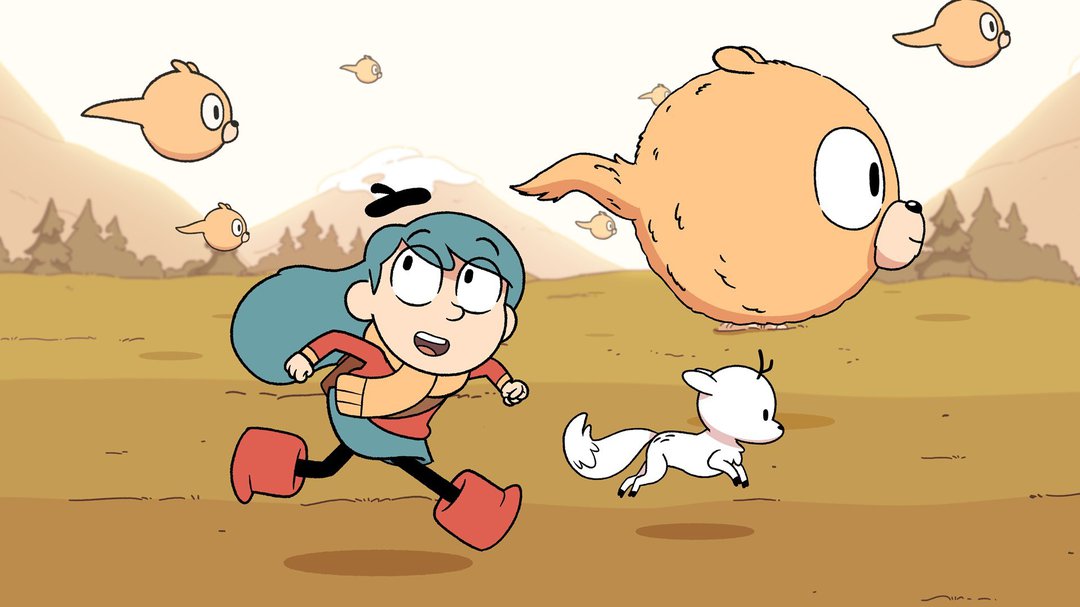
Have you seen the show, Hilda? You could get really creative with the setting you choose to set your town in if you wanted.
Diverse Like Real Life
As a final note before my final thoughts, I absolutely could not end this review without a shout out to the inclusivity and sensitivity that Renegade devoted a fair bit of this book to. In Kids on Bikes you are playing real people, and you’re encouraged to make them real. Want your character to be LGBTQ+, do it. Want to play someone in a wheelchair, totally fine. Want your hero to be on the Autism spectrum? You can do that too. The book spells out in no uncertain terms you are welcome to play these characters but that in no circumstance should any of these characters be reduced to tropes, black and white portrayals, or clichés.
This book reminds us to treat all people as the people they are and not the stereotypes we might reduce them to by making them characters in a game. The book also suggests that GMs and players talk before the session to establish any topic material that someone would prefer not dealing with; if someone has experienced real life trauma and doesn’t want to encounter those situations in the game, the book makes a point of reminding groups they should respect boundaries. It also gives several suggestions for addressing “rewinds” if a player would like something changed that’s accidentally mentioned, or “fast forwards” if they’re ok with a thing happening as long as it’s not experienced “on screen.” Whether the group would prefer a lighthearted, comic tone to their game or a grittier, frightening theme is also up for discussion.
This should all be nothing new to TTRPGs, but it’s good to see it outright stated in the book. In fact it’s refreshing to see! Not that I’ve had to put my foot down on anyone in my own game groups, but I like the idea that if anyone had a problem with any of this, I could just point to a page in the source book and say “it says right here that this is a thing we do and this is why.” Don’t like it? Maybe this isn’t the system for you.
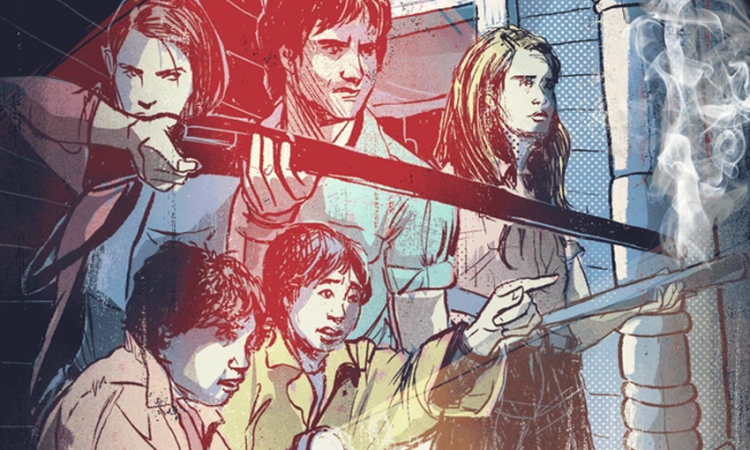
More opportunities by Renegade to let our RPGs reflect the diversity of their players.
That’s A Wrap
Is this system for you? Only you can say for sure, but here are some considerations. Much like my concerns for purchase in my Overlight review, this system is heavily slanted to narrative and roleplaying. This isn’t a system with complex character builds or crunchy dice systems; you come to Kids on Bikes for what it offers. You come for the story and the characters, along with all their interpersonal history and conflict. You don’t come because you can take down a horde of enemies singlehandedly (not without some clever setup at least). If your character takes a bullet to the shoulder, you can bet they’re going to the ER, and they’ll probably be in a sling for weeks. Progression here isn’t handled by experience points, but rather through narrative changes in the life of your character from session to session.
I’d also caution you against this system if you can picture frustration over shared control of the powered character. This is a give-and-take system, so if you’re not able to sit back every now and then to enjoy how the story unfolds, you may be better served by another system. In fact, if you’d prefer to be the powered character all the time but still like the idea of a narrative driven system, maybe you should take a second look at Overlight.
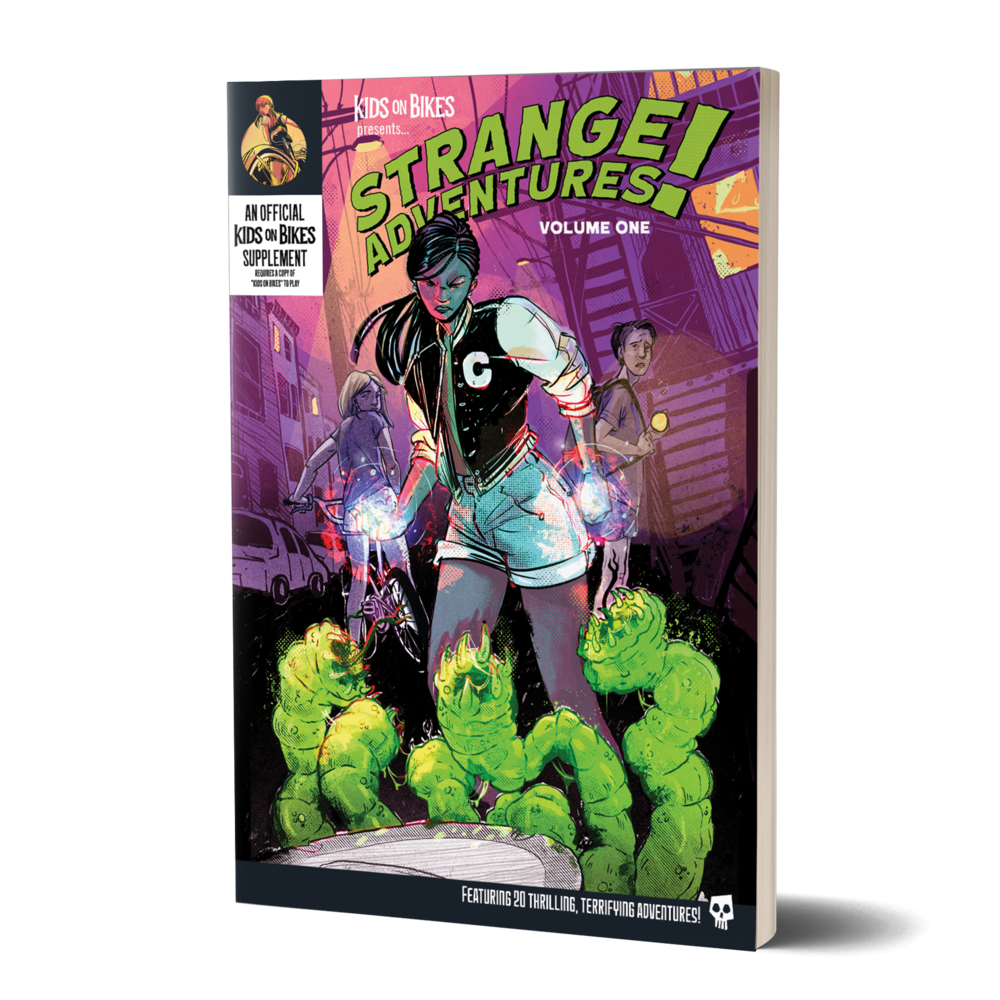
Everything you need for plot hooks and powered characters if all you want to do is jump into a story.
I’ve seen both RPG newbies and vets alike speak fondly of Kids on Bikes, and part of that is how accessibly small the system is. For as diminuative in size as this book is, you get so much game! At $25, the softcover book is a very reasonable buy, though there are lots of options on Renegade’s website. There’s a $35 deluxe edition that comes in hardcover and contains extra modules from the Kickstarter edition. There’s a book of additional adventures in case you just want things to run right out of the gate, and there are custom dice and a deck of cards for the powered character in case you like to accessorize. I appreciate that there are options so you can go as light or as deep as you’d like with this game.
Overall, if you enjoy tabletop RPGs and are looking for something different and easy to pick up, I cannot recommend Kids on Bikes highly enough. If you like the look of it, I encourage you to grab some friends and try it out. And make sure you let someone know where you’ll be before you go wandering off into the woods just outside of town after dark! Not that the rumors of things out there are true. I'm sure it'll be fine.